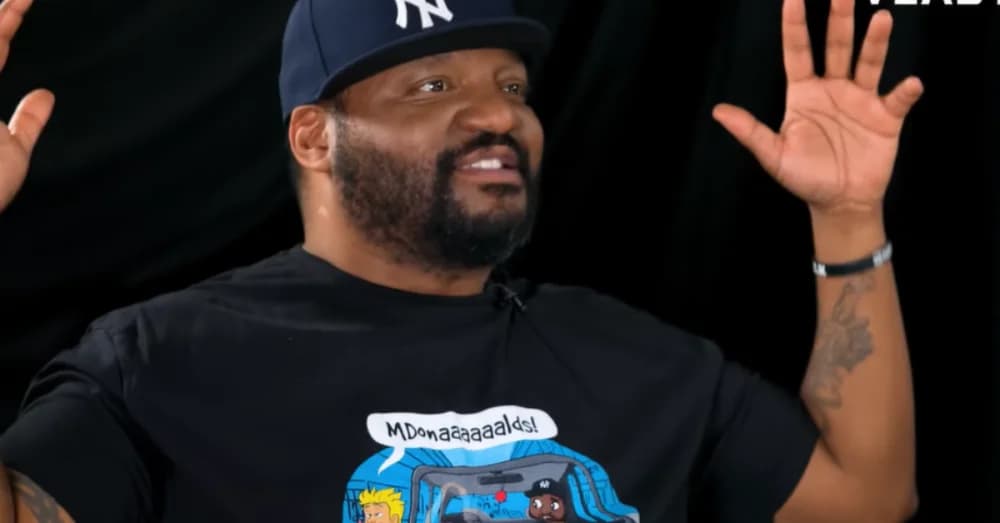Aries Spears Defends Michael Jordan: ‘He Opened the Door for Today’s Black Athletes’

Stand-up comedian Aries Spears recently sparked a conversation about Michael Jordan’s impact on the NBA and his influence on young Black athletes. During an appearance on VladTV, Spears, a longtime fan of Jordan, passionately defended the Chicago Bulls legend against critics who claim that Jordan hasn’t done enough for the Black community. Spears argued that Jordan’s contributions go beyond the court, highlighting his role in revolutionizing athlete endorsements and setting the stage for the lucrative contracts that modern NBA players now enjoy.
In his discussion on VladTV, Aries Spears took aim at those who criticize Michael Jordan for allegedly not doing enough for the Black community. The comedian pointed out that Jordan’s success in the NBA and his subsequent endorsement deals opened doors for future generations of Black athletes. Spears emphasized that Jordan’s achievements have allowed these athletes to secure lucrative endorsements and contracts, which were unheard of in previous generations.
“It always kills me when people go, ‘Man, Michael Jordan don’t do sh*t for Black people.’ Did he not make it possible for all these young Black men in the NBA to now get the endorsements that they get? He kicked open the door,” Spears said emphatically during the interview. He went on to mention that even Isiah Thomas, one of Jordan’s fiercest competitors and critics, acknowledged that Jordan played a crucial role in expanding opportunities for Black athletes in the NBA.
“He did do something for Black people. He didn’t do what you thought he should have done or would have wanted him to do. But his success is the biggest contribution to all these young Black athletes today,” Aries Spears added, making it clear that he believes Jordan’s impact is often overlooked or misunderstood by his detractors.
Michael Jordan’s legacy is not only defined by his six NBA championships and five MVP awards but also by his off-court influence, particularly in the realm of athlete endorsements. Jordan became a household name in the 1980s and 1990s, not just because of his basketball prowess but also due to his groundbreaking endorsement deals. His partnership with Nike, which led to the creation of the iconic Air Jordan sneaker line, revolutionized the way athletes negotiated endorsement contracts.
This model of athlete endorsements, which Jordan helped pioneer, has become the blueprint for how modern athletes build their brands and secure significant financial deals. Beyond Nike, Jordan’s endorsement deals with companies like Coca-Cola, Hanes, and Gatorade set the standard for athlete representation and marketability. His success in this arena laid the groundwork for the massive contracts and endorsement opportunities that today’s NBA players, especially Black athletes, now enjoy.
Moreover, Jordan’s influence helped elevate the NBA’s global popularity, which in turn led to more substantial broadcasting deals and increased revenue for the league. This financial growth has allowed NBA players to earn more money than ever before, with salaries and endorsements reaching unprecedented heights.
Despite his monumental impact on the sport and its athletes, Michael Jordan has faced criticism over the years for his perceived lack of involvement in civil rights issues. One of the most infamous criticisms stems from his reported comment, “Republicans buy sneakers, too,” which has been used to question his commitment to social justice causes. Jordan has also been criticized for not being more vocal during movements like Black Lives Matter.
Sports historian Johnny Smith, in his work on Jordan’s legacy, argued that had Jordan been more outspoken on civil rights during his playing days, his financial success might have been hindered. Smith explained that the 1980s and 1990s were far more conservative times than today, and Jordan’s ability to become a spokesperson for major brands—and ultimately the first Black majority owner of an NBA team—was likely influenced by his decision to avoid political controversy.
“I would argue that had he been an outspoken civil rights figure in the 1980s and 1990s, a much more conservative time than we are living in now, he would not have had the same access to becoming a spokesman, and he wouldn’t have been able to build the incredible wealth that allowed him to become a pioneer as a team owner and part of the sports ruling class,” Smith noted.
The debate surrounding Michael Jordan’s legacy is complex and multifaceted. On one hand, his unprecedented success as an athlete and businessman has undeniably opened doors for countless Black athletes, allowing them to benefit from the financial rewards that were previously unattainable. On the other hand, his reluctance to engage in political activism has left some questioning the extent of his commitment to broader social causes.
Aries Spears’ defense of Jordan highlights a critical aspect of the discussion: the idea that success and influence can take many forms. While Jordan may not have been an outspoken civil rights advocate, his achievements in sports and business have had a profound impact on the lives of many Black athletes, providing them with opportunities that extend far beyond the basketball court.
As the conversation around athletes and activism continues to evolve, Michael Jordan’s legacy will likely be revisited and reinterpreted. However, it is essential to recognize the ways in which his contributions have shaped the modern landscape of professional sports, particularly for Black athletes who now stand on his shoulders.
In the end, Michael Jordan’s influence on the NBA and the broader sports world cannot be overstated. His legacy, though often scrutinized, continues to inspire and empower athletes across the globe.





